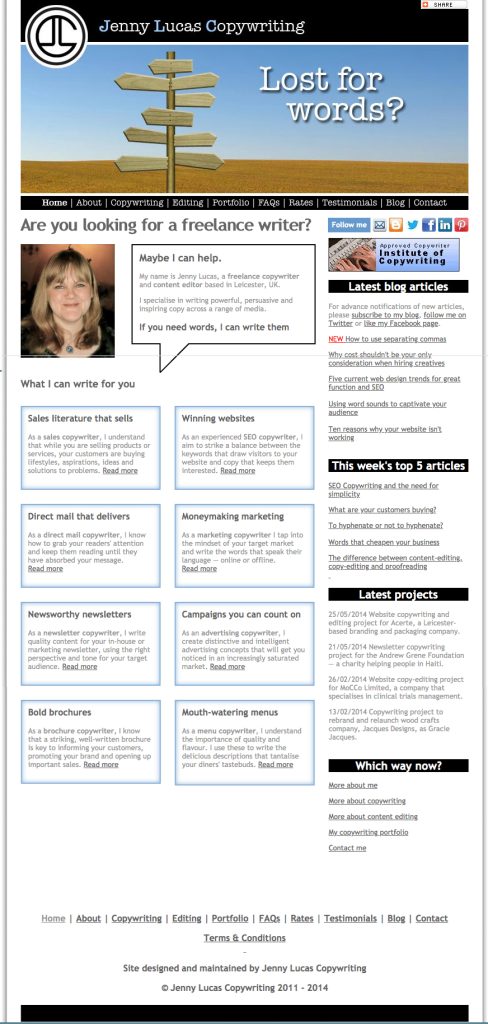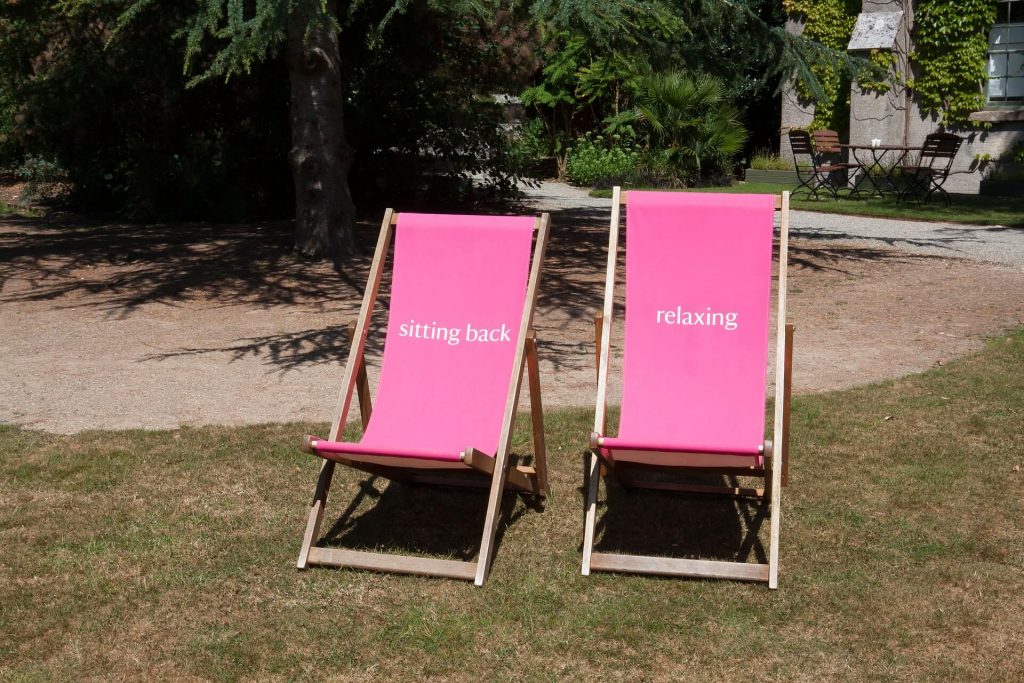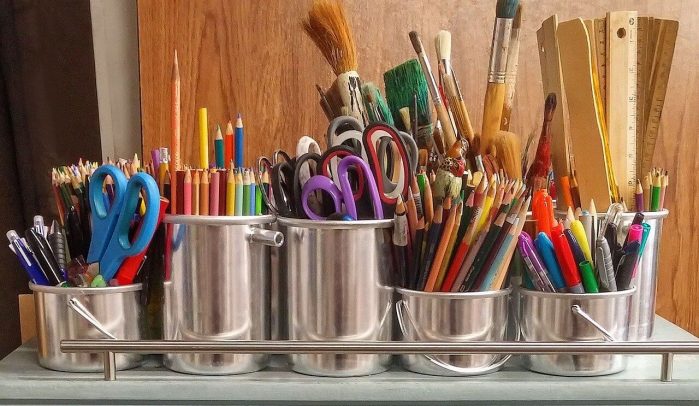UPDATED SEPTEMBER 29, 2023
Thinking of designing your own website?
If your business needs a website, you might be thinking of going down the DIY route with a website builder.
I mean, it’s just filling out a template, so how hard can it be? Right?
Before I called in the professionals to design this beauty, I designed and built six websites of my own from scratch. So in this post, I thought I’d share some of the pros and cons of this approach. Hopefully sharing my experience will help with your decision.
I designed my first website in 2011
This is the home page of the first website I ever built, back in 2011.
I built it from scratch, with nothing but a vision and some cheap software from WH Smith!

Obviously it looks dated now and it doesn’t follow any of the rules of good website design we use today. But for five years it served me well and brought me more clients than I could ever have imagined.
Now, I should point out that before I built my websites, I wasn’t a complete novice.
I had some graphic design skills, I’d done a six-month Dreamweaver course, and I’d attended evening classes in SEO and digital marketing for two years. I wasn’t an expert by any means, but I had the basic skills I needed to pull something together.
Things have changed so much since then. A spate of website builders have made DIY website design more accessible to everyone.
But is it better to do it yourself or hire a professional?
Here are two questions I would recommend you ask yourself before you start:
1. Do you have the understanding?
Even with all the tools available, it helps to start with a basic understanding of design, websites and how they work.
This includes things like:
- Design and layout
- Functionality and user interface
- Colours and branding
- Image optimisation
- Website terminology
- Search Engine Optimisation
- Copy and content writing.
If you don’t already have this understanding, you can learn as you go, but be prepared for it to take time. Which brings me onto my next question.
2. Do you have the time and commitment?
Building your own website, doing it properly and committing to getting it finished will take time and patience.
But if you’re running a business, there will be plenty of other things that need your attention and where your time may be better spent.
And if you’re not committed to completing it, it could end up as one of those unfinished projects that you laugh about awkwardly whenever someone asks to see it.
If you’re still thinking you can do this, we need to move onto our next section: The pros and cons.
Let’s start with the pros.
The pros of designing your own website
Quick and easy set-up
There are plenty of DIY website builders to choose from that will help you create your site.
They include sites like:
Many of these have pre-designed templates that allow you to drop your content straight in.
If you only need a simple site and you’re happy using one of these templates, you should be able to get your website set up and published in no time — without any technical skills.
You’ll save money
A DIY website builder is a budget-friendly option that will cost you far less than hiring a professional web developer.
But — and you knew there’d be a but — what you do save in money, you’ll probably spend in time and effort.
You’ll be in control
With a DIY website builder, you can build your site your way and at your own pace.
Once it’s built and published you’ll have full control over it. This means you can make changes or additions yourself whenever you want to — without involving anyone else or incurring any extra costs. This is something I valued when I designed my own websites.
Most professionally designed websites come with a Content Management System (CMS) that allows you to add your own blog content and make basic changes. But it might not give you the same freedom as a DIY one.
You’ll learn new skills
Building and managing a website requires some skills you might not have. Like basic branding, creating layouts, writing content and sourcing images.
Gaining and using those skills can help with your personal development and you’ll get a great sense of accomplishment when the site is completed.
You can scale your website with your business
DIY website builders typically have a tiered pricing system. So you can start out with a simple, low-cost website, then upgrade it by adding pages and features as your business grows.
You’ll have full ownership
You’ll have full ownership of your website and it’s domain, which may not be the case if you work with some professional developers.
You can use it as a trial run
Getting a professional website designed can be a huge and costly undertaking, so you want to be sure you get it right.
The experience of building and running a DIY website will help you make important decisions about:
- What works and what doesn’t
- What you like and don’t like
- What features you need.
Your experience will prepare you for working with a professional web designer. And you’ll feel more confident about having input into your design.
The cons of designing your own website
It could take up a LOT of time
If you’re a perfectionist who likes things to be just so, you could spend hours, days and weeks fiddling about with your DIY website design and words. I know I did.
When you calculate how much your time is worth, and how much of it you could be spending on these things, you might decide it’s just not worth the hassle.
You’ll need to learn some SEO
Search Engine Optimisation (SEO) is what will make your website show up on Google’s search results page. And this is how your ideal customers will find it.
Without SEO, your website will miss out on organic search traffic and the business that comes from it.
But learning SEO and how to apply it is something else that will take up your valuable time. And the results you could get from a professional service will, undoubtedly, be better.
It might not look professional
DIY website builders will give you some design pointers, but even so, you can usually tell a DIY website design from a professionally designed one.
Rookie errors include:
- Stretched, distorted and low quality images
- Inconsistent use of typefaces and colours
- Broken links and poor functionality
- Badly written content that’s full of errors
- Issues with the display at some screen sizes or in some browsers.
You can read more about this in my article 15 Cringeworthy web design mistakes >>
It might not sound professional
If you’re not a born writer, your content could have all kinds of problems. From spelling and grammatical errors to paragraphs that don’t make sense, don’t read well — or don’t say quite what you think they do.
Even if you write well, your web copy might not have the customer focus or pizzazz it needs to turn those visitors into paying customers.
It might be difficult to customise
DIY websites are easy to create because they use pre-designed templates. If you’re an inexperienced user looking for an easy result, this is fine.
But, if you already have a clear idea of how you want your site to look, you may find the templates provided are too inflexible and don’t allow enough options for customisation. I know from experience that this can be frustrating.
It won’t be completely original
If you’re using a DIY website template, you can bet your bottom dollar that countless other businesses are using it too. And, if it’s a template that’s been designed for your sector or industry, they could be your competitors.
Of course, you can customise it with your own words and images, but, as I said in the previous point, the customisation options might be limited.
It might not be adaptable
There’s nothing worse than putting your heart and soul into your new DIY website, then, six months down the line, wanting to add a new feature and finding it’s not possible.
So if you’re considering a DIY website, think about how your business might progress over the coming years and what you might want to add to it. If the tool you’re planning to use doesn’t support your plans, maybe you need to have a rethink.
You might be too close to it
You may find it difficult to create your own DIY website, because you’re too close to it. And you may not see it clearly, or from your customers’ point of view.
One of the main advantages of outsourcing your website to professionals is that you’ll benefit from their objectivity and insight. This means your site will be more customer-focused and less about pushing your own agenda.
You’ll be on your own if things go wrong
With a DIY website, everything is your responsibility.
This includes updates, security, backups, and fixing it when things go wrong — which, inevitably, they do.
My own website started developing problems in 2017. And though I tried everything I could to fix them, there was nothing I could do. In the end I had to admit defeat and called in the professionals, who designed this new site for me.
When you’re relying on your website, as I was, this is not a good situation to be in.
You might also like…



About the author
I’m Jenny Lucas, a freelance copywriter, content writer and website specialist, based in Leicestershire, UK.
Since I started my freelance copywriting business in 2011, my website has been my main source of clients. From my first DIY effort at the top of this post to the professionally designed website you see here today.
Websites have evolved a great deal over the last 12 years and my website has evolved with the times, following best practice with regard to layout, format, copywriting and organic SEO.
If you’re planning a new website and need some help with your written content, maybe I can help.
You can find out more about me and my services on my main website.

